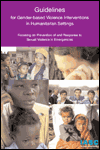IMPORTANCE OF GENDER ISSUES IN EMERGENCIES FLOODS IN PAKISTAN
16 Q 232 L’IMPORTANCE DES SAVOIRS TRADITIONNELS DANS LE17 IMPORTANCE IN SCIENTIFIC DISCOVERY 1 WHY IMPORTANCE MATTERS
3 MODULE 14 UNDERSTAND THE IMPORTANCE OF FINANCIAL INFORMATION
A BUNCH OF FACTS ABOUT THE IMPORTANCE OF TINTERN
ACCESS FOR ALL THE IMPORTANCE OF INCLUSIVE SERVICES
ANALYSIS OF PARAMETER IMPORTANCE IN SPEAKER IDENTITY JM GUTIÉRREZARRIOLA
Importance of Gender Issues in Emergencies - Pakistan Floods 2010
IMPORTANCE OF GENDER ISSUES IN EMERGENCIES
FLOODS in PAKISTAN- 2010
Experience from past natural disasters reveals that important differences between men and women often go unrecognised. In the midst of the urgent humanitarian response, the provision of food, shelter, health, clean drinking water and sanitation facilities receives a lot of emphasis, but failing to address the differentiated needs of men, women, boys and girls can increase disparities between women and men, and further marginalize vulnerable groups. . Taking into account the different needs of women, girls, boys and men makes our humanitarian response more effective.
Gender is a cross-cutting issue, requiring a gender-responsive approach that meets needs equally and recognises the different capacities and vulnerabilities of women, girls, boys and men. It is the responsibility of all clusters to ensure access to and benefit of services to all segments of the population. The Gender Task force and number of humanitarian gender advisors and women’s advocates are available to assist you in this task.
ATake these 3 immediate actions to ensure that women, girls, boys and men get access to and benefit from humanitarian response:
BSSESS NEEDS: The needs of women, girls, boys and men are different after an emergency so special efforts must be made to assess the needs of each of these groups. Ensure that women and men are part of any needs assessment teams and that the needs of all portions of the affected population are assessed.
E ALERT: to risks experienced by unaccompanied women, boys and girls, especially the risk of violence they may face. Put in place measures to ensure their safety and security.
C
OLLECT DATA BY SEX AND AGE: All efforts should be made to collect data on who has been affected, including deaths, injuries, displacement, and who is receiving services. Remember from the tsunami: mortality for women was three times higher than for men.
For more details, please refer to aspects of the ADAPT and ACT framework for gender programming found in the IASC Gender Handbook and use the GBV guidelines.
http://gender.oneresponse.info and http://gencap.oneresponse.info


The Gender Task Force has identified a pool of gender Field Gender Advisors for participation in the field missions. Contact email: [email protected]; [email protected] and [email protected]
Immediate Concerns: how to address gender in your cluster
Emergency Shelter
In overcrowded collective centres families and individuals belonging to different areas feel exposed and uncomfortable. Ensure that special measures have been taken to provide separate accommodation for unaccompanied girls, boys and young women away from adult males so that that adequate privacy is offered to all. In case the shelter materials distribution, ascertain the impact and usefulness of distribution systems for women and girls .
Health
Flooding and non-availability of water for drinking or cooking are contributing elements in the outbreak of diseases like diarrhoea, malaria, respiratory infections etc. Some of the identified are needs listed below and critical for gender-responsive health care in this emergency:
Anti-Diarrheol Kits and effective mechanisms for distribution
Psycho-social support by the trained counselors
Vaccination for children under 5 and pregnant mothers
Obstetric and gynecological care ( by trained doctors and skilled TBA)
Food supplements for lactating mothers
Presence of women staff especially trained doctors and other health professionals
Medicines especially life saving
WASH
Non-availability of safe drinking water and damage to sanitation infrastructure are causing skin problems and infections especially among women and children. It is essential that WASH actors consult with women and girls on the location of sanitation facilities to ensure that the route is safe; that latrines be well lit, lockable form the inside, and offer privacy and accessible by those with disabilities.
NFIs DISTRIBUTION:
Initial assessments carried out by Provincial Disaster Management Authorities and humanitarian agencies such as the World Food Programme indicate that the floods have damaged or destroyed at least 250,000 homes across the flood-affected provinces. Distribution mechanisms must be responsive to access-related issues and cater to the needs of women and vulnerable individuals. Be mindful of and find ways to address the conservative social setting that constrains women’s mobility. NFI distribution should be tailored to meet the changing family make up.
ASIAN SEMINAR ON IMPORTANCE OF FOOD QUALITY
ASSIGNMENT TITLE THE IMPORTANCE OF PLAY ASSESSOR QUALIFICATION SUITE
“THE IMPORTANCE OF FAILURE” ADMISSIONS CEREMONY – FRIDAY 18
Tags: emergencies floods, floods, pakistan, gender, emergencies, importance, issues
- 55 INTRODUCTION US CURRENCY AND COIN OUTSTANDING AND IN
- ORZECZENIE LEKARSKO – WETERYNARYJNE IIDENTYFIKACJA ZWIERZĘCIA 1GATUNEK2RASA 3PŁEĆ4URODZONY5MAŚĆ 6ZNAKI
- ……………………………………………………………………… IMIĘ I NAZWISKO KANDYDATA DO NAGRODY PREZESA RADY
- CURSO BIOLOGÍA MOLECULAR Y CELULAR CARGA HORARIA 8 HORAS
- QUE DECLARA DE INTERES SOCIAL Y EXPROPIA A FAVOR
- DEMOGRAFSKI KAZALNIKI IN NAČINI NJIHOVEGA IZRAČUNAVANJA NAVAJAMO POJASNILA Z
- LUNES 26 DE AGOSTO DE 2019 DIARIO OFICIAL SECRETARIA
- 4 FORM 9 PROBATE DISTRICT PROBATE
- SUMMARY OF OUTCOMES FOR LOCAL GOVERNMENT FROM THE AUSTRALIA
- EBMT DISEASE STATUS DEFINITIONS ALLAML PRIMARY INDUCTION FAILURE MEANS
- OBRAZEC 1 PRIJAVNI LIST ZA ODPRAVO POSLEDIC ŠKODE NA
- KOM IGÅNG MED INFOMENTOR LATHUND INNEHÅLLSFÖRTECKNING VI HJÄLPER
- CENTRUM VOĽNÉHO ČASU N MESTO NV VYHLASUJE KASTING DO
- THE VALUES CLARIFICATION WORKSHOP OUTLINE BELOW IS FORMATTED TO
- PRODUKTION X INSPELNINGSPLATS X GJORD AV X DATUM X
- 171 ΚΛΙΝΙΚΉ ΨΥΧΟΛΟΓΊΑ Ι ΑΚΑΔΗΜΑΪΚΌ ΈΤΟΣ 20142015 ΧΕΙΜΕΡΙΝΌ ΕΞΆΜΗΝΟ
- WG1 INF2A 29 JUNE 2009 C ONVENTION OF
- USING SMALL AREA MODELS TO ESTIMATE THE TOTAL AREA
- PHYSICAL SCIENCE STRAND PROCESSES CONCEPTS AND APPLICATIONS GRADES
- AFSCARRIERSNET INSTRUCCIONES PARA FACTURACIÓN EN LÍNEA VISIÓN GENERAL AFS
- ÖZGEÇMİŞ 1NAME SURNAME NILÜFER ŞEHRIBAN ÖZABACI 2CONTACT INFORMATION ADDRESS
- ESSAY COMPETITION 2019 THE POLISH HERITAGE ASSOCIATION OF MICHIGAN
- BUDGET TO ACTUAL REPORT INSTRUCTIONS ANSWERS TO COMMONLY ASKED
- GUVERNUL ROMÂNIEI ORDONANŢĂ DE URGENŢĂ NR 50 DIN 21042008
- SPEECH LANGUAGE AND COMMUNICATION DESCRIPTORS 2013 CONTENTS PAGE OVERVIEW
- LEY DE CONCESIONES ELÉCTRICAS DECRETO LEY N° 25844 ()
- OVO JE NESLUŽBENA PREČIŠĆENA VERZIJA ZAKONA ŠTO JE POTREBNO
- NO 950 GENEVA 17 JANUARY 1997 CONCERNING ANNEX TO
- UNITED NATIONS DEPARTMENT OF PEACEKEEPING OPERATIONS NATIONS UNIES
- P ROFESOR LUIS ESCOBAR LORCA GUÍA DE APRENDIZAJE ASIGNATURA
INSTRUCCIONES PARA LA MATRÍCULA DEL CURSO 20152016 RELLENE LA
 PROJEKT WSPÓŁFINANSOWANY WSPÓŁFINANSOWANY ZE ŚRODKÓW UNII EUROPEJSKIEJ W RAMACH
PROJEKT WSPÓŁFINANSOWANY WSPÓŁFINANSOWANY ZE ŚRODKÓW UNII EUROPEJSKIEJ W RAMACH PHYSICS 103 GENERAL ASTRONOMY HW 2 SOLUTION SET THERE
PHYSICS 103 GENERAL ASTRONOMY HW 2 SOLUTION SET THERE PEER REVIEW DRAFT… DRAFT… DRAFT… DRAFT CONTRA COSTA COUNTY
PEER REVIEW DRAFT… DRAFT… DRAFT… DRAFT CONTRA COSTA COUNTY DIRECCIÓN GENERAL DE DOCENCIA COORDINACIÓN DE SERVICIOS ESCOLARES APROBACIÓN
DIRECCIÓN GENERAL DE DOCENCIA COORDINACIÓN DE SERVICIOS ESCOLARES APROBACIÓN DIVISIÓN DE DISTRIBUCIÓN ORIENTE ADMINISTRACIÓN DIVISIONAL ACTA DE JUNTA
DIVISIÓN DE DISTRIBUCIÓN ORIENTE ADMINISTRACIÓN DIVISIONAL ACTA DE JUNTA CONFLICTOS LOS DOS MONSTRUOS BASADO EN EL LIBRO DE
CONFLICTOS LOS DOS MONSTRUOS BASADO EN EL LIBRO DEINFORMACE PRO RODIČE ŽÁKŮ V KONTAKTU S COVID POZITIVNÍ
2 ПРИЛОЖЕНИЕ 1 К ПОЛОЖЕНИЮ О ПРОВЕДЕНИИ ВСЕРОССИЙСКОЙ ЛЕГКОАТЛЕТИЧЕСКОГО
 PRUEBAS DE ATLETISMO EL ATLETISMO ES UN CONJUNTO DE
PRUEBAS DE ATLETISMO EL ATLETISMO ES UN CONJUNTO DE SOLICITUD DE ADMISIÓN A CONVOCATORIAS DE BOLSAS DE TRABAJO
SOLICITUD DE ADMISIÓN A CONVOCATORIAS DE BOLSAS DE TRABAJO OPTIMIZING CLIENT CENTER HOLDINGS 1 MÜŞTERI MERKEZI STOKLARINI OPTIMIZE
OPTIMIZING CLIENT CENTER HOLDINGS 1 MÜŞTERI MERKEZI STOKLARINI OPTIMIZESKOČ DO ŽIVOTA – SPÄTNÁ VÄZBA ĎAKUJEME ŽE STE
 E L PROGRAMA DE PROTECCIÓN INTEGRAL FINANCIADO CON FONDOS
E L PROGRAMA DE PROTECCIÓN INTEGRAL FINANCIADO CON FONDOSSILABUS MATA PELAJARAN PEKERJAAN DASAR TEKNIK OTOMOTIF (DASAR BIDANG
 OUTSTANDING ACHIEVEMENT AWARD APPLICATION THE WALSH UNIVERSITY ALUMNI ASSOCIATION
OUTSTANDING ACHIEVEMENT AWARD APPLICATION THE WALSH UNIVERSITY ALUMNI ASSOCIATION MINUTES OF THE COUNCIL MEETING HELD AT THE COUNCIL
MINUTES OF THE COUNCIL MEETING HELD AT THE COUNCIL TC BAŞBAKANLIK TOPLU KONUT İDARESI BAŞKANLIĞI ALT GELİR
TC BAŞBAKANLIK TOPLU KONUT İDARESI BAŞKANLIĞI ALT GELİRAPELLIDOS Y NOMBRE NIFDOMICILIOMUNICIPIO PROVINCIA CÓDIGO POSTAL
IMAGEN Y SONIDO LA MATERIA DE IMAGEN Y EL